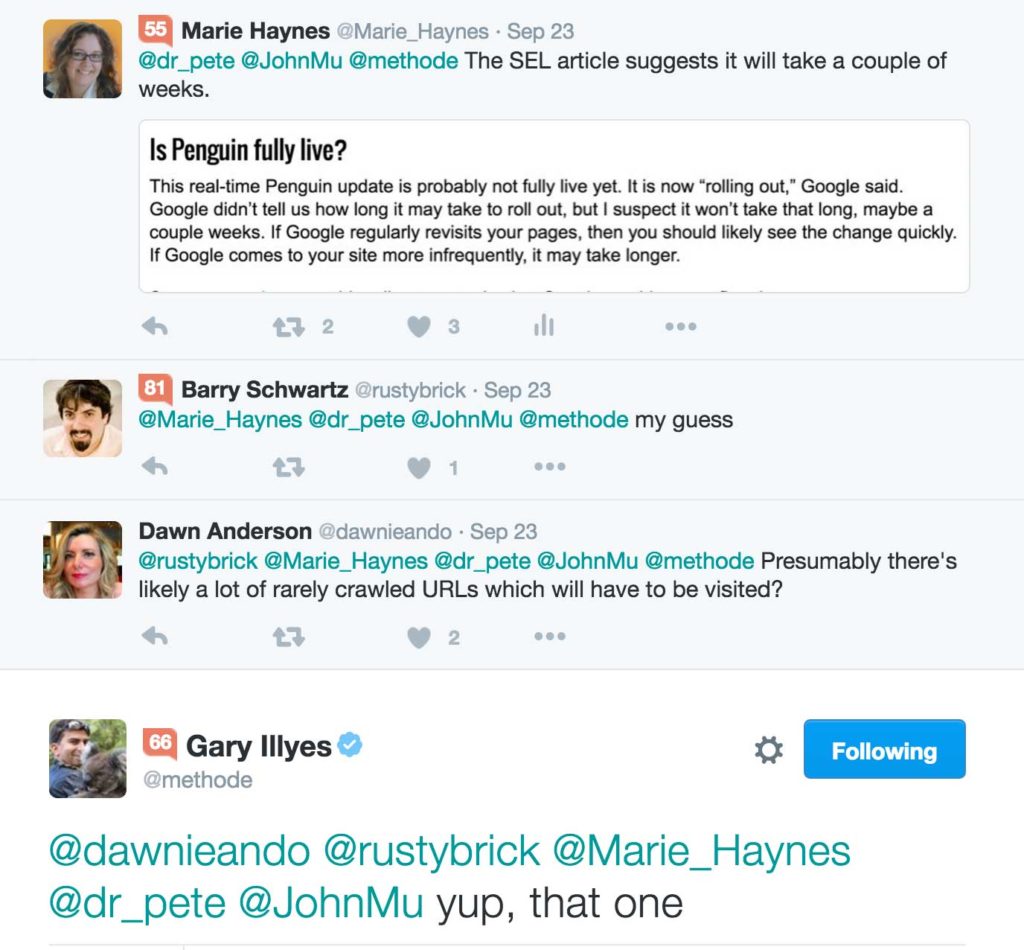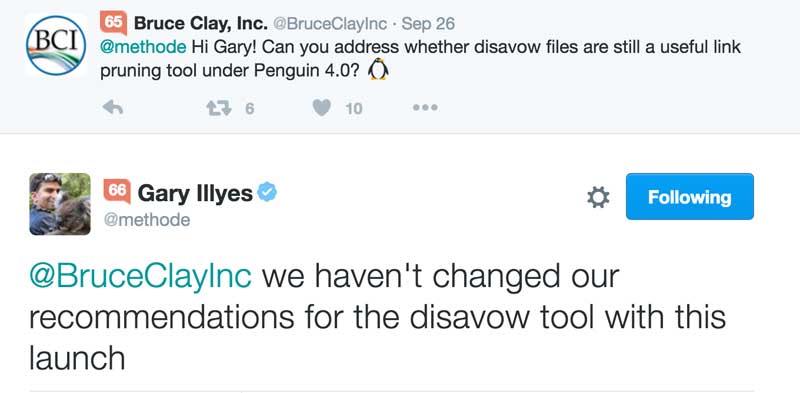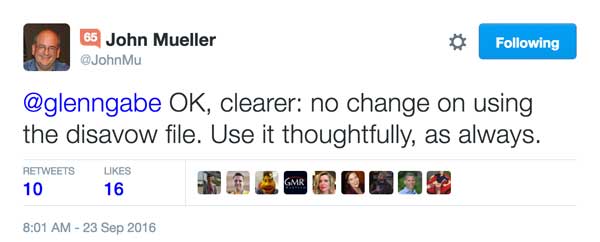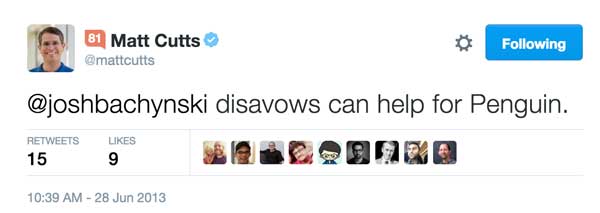Note: This article was written to explain my early thoughts on Penguin. I've written a full article here on everything we know about Penguin and will be updating that article regularly.
Jump to updated info on whether or not the disavow tool is necessary for Penguin recovery.
For even more updated news, check this new post: Sites previously demoted by Penguin are getting the "penalty" lifted off of them!
After almost two years of waiting, Penguin 4.0 has finally arrived. I can't believe how poor the timing was for me as I got the news while traveling to Toronto for a four day trip with almost no internet access. Perhaps that was a good thing though as it allowed me to look a few days of data before publishing my thoughts on Penguin 4.0.
My first impression on Penguin 4.0 so far is that it is underwhelming.
Seeing any changes?
The majority of sites that I monitor for Penguin changes have seen absolutely no change. However, I have a couple of sites that have seen dramatic increases in keywords jumping from beyond page 5 to page 2 or 3. While those changes are dramatic, they're not going to help pay any bills at this point.
Is this a slow rolling update?
I suspect that we will see more changes gradually over the next few weeks and months. On Twitter, I quoted Barry Schwartz speculating that this was a slow rolling release. Dawn Anderson asked Gary Illyes from Google if it were true that we would still need to wait for our disavowed URLs to be crawled, and Gary Illyes agreed that yes, this was the case:

If this is true, then it makes sense that we haven't seen any dramatic stories of Penguin recovery just yet. It may be that Penguin has been released and that we will see changes as Google recrawls the web. Gone are the days where we see beautiful spikes in traffic that coincide with an algo update. Now that Penguin is baked into the algorithm, I suspect that we will see a slow increase over time.
Do we still need to disavow?
Google's announcement on Penguin 4.0 had a line in it that had some speculating that perhaps all that Penguin was doing was devaluing spammy links:

While I do believe that it's true that Penguin devalues spam links, I also think that Penguin has a further dampening effect on a site. That dampening effect can be huge or small depending on the level of distrust that Google has in your link profile.
Simply devaluing spam links would make the problem of crappy link negative SEO go away. But, if all that Penguin did was devalue spam, then there would be no reason for spammers not to try new spam techniques. In other words, if I were a black hat link builder I could keep trying different link techniques to rank my sites until I found what got past Penguin and I would see no negative effects from my efforts.
I still firmly believe that when a site is affected by Penguin, Penguin acts as an anchor that pulls your site down. In the past, John Mueller has said that moving forward with a Penguin hit site without cleaning up links would be like "driving the car with the handbrake on, or having an anchor that is pulling you down". I firmly believe that when a site is hit by Penguin, it's like a weight is put on the site to keep it from ranking at its full potential. I don't think that this has changed significantly with this new iteration of Penguin. However, I'm not completely sure what Google means by Penguin being more granular. I think it's possible that that anchor or handbrake may only affect parts or pages of a site rather than the whole site. We'll have to wait until we get more information to make that decision.
Google has said a couple of times over the weekend that we should still be disavowing links:


To me, this issue is HUGE. It's no secret that I have been a big proponent of the disavow tool. I have written of examples of sites that saw recovery from Penguin by disavowing unnatural links. I do not think that this has changed with the launch of Penguin 4.0. My opinion is possibly biased as I make a good income from offering link audit services, but I promise not to let that bias cloud my judgement. I will be watching with great interest over the next few weeks and even months as Penguin rolls out to see if we can see more recovery cases.
Added on September 28, 2016
Google has added more information on the use of the disavow tool for Penguin hit sites. This info is confusing me. You can read the SEL article here. In it, Gary Illyes says the following:
Traditionally webspam algorithms demoted whole sites. With this one we managed to devalue spam without demoting.
When asked for clarification on whether or not it was necessary for site owners to use Penguin to recover from Penguin, he said:
For Penguin specifically, there's less need, yes.
Hmmm...ok, less need. What does this mean?
He went on to say:
If you see the crap, you can help us help you by using it.
Again, what does this mean?
I think there are a few possible ways this could be interpreted:
- It's possible that Penguin will no longer demote a site and act as an anchor that holds the site down. But, if this is the case, other algorithms that use links could still negatively affect you and as such, it is a good idea to disavow.
- It's possible that "crap links" that are horribly spammy such as comment spam and the like that are used for negative SEO are automatically discounted and as such there is no need to disavow. But, it's possible that self made SEO links (such as purchased links) could still do harm. That's my interpretation though and Google did not say this.
Also, just to confuse matters, Google keeps saying that their recommendations on using the disavow tool have not changed. Yet, Matt Cutts himself has said publicly that it is a good idea to use the disavow tool for Penguin:

I will be running a case study starting today that should help to answer some of my disavow questions, but it will take some time for the study to be complete.
A theory - New links are very important to build up TRUST
I feel that Penguin is primarily about how much Google trusts the quality of your backlinks. Disavowing or removing unnatural links can really help improve the level of trust that Google has in your links. But it would make sense to me that an even better way to improve that level of trust would be to demonstrate that your site can actually get good links. I think that if your site does not have a steady flow of truly natural links coming in then unfortunately Penguin recovery may not happen.
This makes sense naturally as simply getting rid of spam links should not bounce you back to number one. I think it goes deeper than this though. I've seen sites that after getting hit by Penguin are unable to rank for anything. If all that Penguin did was to remove the benefit of those unnatural links, they should be ranking at least somewhere in the first three pages. I think that once hit by Penguin, you may be continually suppressed until you can prove to Google that you truly do have a site that can attract natural links. (Note: added September 28 - Penguin sites that were previously demoted are now having the demotion lifted off!)
If you are going to Pubcon Vegas in October of this year, I'll be speaking more on the subject on trust and link acquisition. I'll also be presenting some case studies of sites that saw good Penguin recoveries that I believe were due to a combination of link cleanup plus excellent link acquisition. I will be talking in great detail on how those sites obtained their good links.
Early days yet
We are only four days into the new age of Penguin 4.0. If you have been awaiting recovery and haven't seen it yet, please be patient. I'll be updating people via my newsletter on any obvious changes that I am seeing.
I'd love to hear your observations on Penguin in the comments below.



Comments
This algo could be renamed “cricket” as I have not seen any changes. I have seen more movement with the core update between Sept 1st to Sept 4th and the the update on the Sept 13. The update at the beginning of September was geared towards best practices. The Sept 13th update was not and reversed those changes. The other Sept updates were felt much quicker as they rolled out faster. “Penguin 4.0” is a calm lake. Sorry, you were thinking about it on your trip, but it was nothing.
Hi Marie,
Thanks for sharing the early finding here.
I’ve always had one issue with reporting on recoveries when it comes to link penalties, and I’d appreciate your take on it – I believe you have the same thoughts.
Since these updates were so far apart I’ve always thought that it would be hard to say “This link cleanup didn’t work”, or “This penguin refresh hasn’t rolled out” because the SERP positions depend on every other site ranking in those SERPs as well.
If my site was hit and I spent time cleaning the links up – while other sites that were penalized (and the ones that weren’t) continued to build positive link equity, then it would make sense that I wouldn’t see the rebound I was expecting because every other site continued to grow as well.
I think it’s too tough to tie the recovery process together with the new link building process AND attempt to analyze every other site’s progress with this in a specific SERP. I do however appreciate the anecdotal reports of recovery etc. as they can still tell us something.
Looking forward to your thoughts.
Thanks,
Dylan
I see your point Dylan. There are definitely cases where it can be hard to proclaim or even expect recovery.
I have a lot of cases though where a site is unable to rank for anything. Here’s a fictitious example. Let’s say the site was a chiropractor’s site who was trying to rank organically for “chiropractors in atlanta”. Yet, no matter what they do, they are stuck on page 6 for this term. I’m not expecting this site to jump up to the number one position with a Penguin recovery, but I would expect that there should be some type of movement beyond page 6. There are some sites that I just know are being suppressed for rankings and really should see some type of improvement.
I find it odd that other algos and updates were quick and swift, yet Panda and Penguin seem to be slow roll outs now that that are built into the core updates or are now real time.
Yeah, there are still a lot of unknowns when it comes to Penguin. Oh how I wish I could see the logic behind all of their algos!
I’m definitely with you there. So many people expect recovery after cleaning up the links that were previously helping them rank before Penguin. They’re no longer in a penalty but what do they expect will have them ranking beyond page 6 – per your example.
Cheers,
Dylan
A really interesting post, Marie. I agree it’s early days and we’ve seen hardly any changes to site rankings (yet) on our UK rankings. We’ve done a lot of work on disavowments and link removals since Penguin 3.0 and remain optimistic we will see an improvement. I loved your comment “it’s like a weight is put on the site to keep it from ranking at its full potential”- my thoughts entirely, this is our experience anyway!
Hello Haynes,
I agree with you that, penguin 4 might take several weeks to be completely effective. I have a question here after the comments of Garry – we should be still disavowing the bad links till Google says something about it?
Thanks,
Nasir LNB
Hi Nasir,
Yes, my opinion is that we should still be disavowing bad links. I don’t see any reason not to.
Nasir, John Mueller has advised people to keep using the disavow tool as there are other ranking factors and algos that may count those bad or suspect links.
Hi Marie,
Thus far, very few (if any) sites that were suppressed by Penguin have been released from suppression. I understand that not every site will “recover” to previous rankings, but release from suppression should be a reasonable expectation.
So, if weeks and months go by, and previously penalized sites stay suppressed, does that mean that they are going to be penalized forever, with no hope of ever recovering? If that is the case, it would appear that Google made all of the previous Penguin penalties permanent before releasing the new real-time Penguin.
If this proves to be true, what will the SEO community do to address this? Surely the SEO community can band together, in one concerted effort, to urge Google to provide a way out of perpetual suppression for sites that spent years working towards recovery, and are now in full compliance with Google’s guidelines?
I look forward to your thoughts.
We’re only a few days into this new Penguin, but I saw some great lifts in keyword rankings for some Penguin hit sites yesterday and further improvement today. I am really thinking that Penguin may indeed be fair again. But it’s too early to say with certainty.
I’d say we should come back to this question again in a month or two. It will be interesting to see if all sites that were suppressed stay suppressed. Of course though, it’s going to be hard to tell whether those sites simply just don’t deserve to rank.
Hi Marie,
Interesting read and great insight. Good read 🙂 I like your concept of the link trust, which leads me to my rant below.
Interestingly enough in our U.S and CAN based sites in some very competitive market spaces, we saw huge volatility in rankings/jumps with swings in the (+/- 15 positions) on certain days (more U.S than CAN overall though at this time) starting first week Sept. Huge swings in KW ranking positions both ways, that in some cases have steadied now to some extend (I think this was Penguin running a verifications on the link profiles) as it was being released into the wild, as it started in that first week of Sept right around all the chatter about some major core changes.
My point is, some URL’s are showing drops but they are marginal of 1-2 positions in general that things have slowed down. It seems to be heavily based on Anchor text % though from our preliminary analysis. I know Gary was talking about a multi-algo core release where various things changed, and we have seen some of that with the local 3 pack stack too for various businesses. Things are regulating now.. this is nice as it’s less stressful overall. Clients always go a little wonky when they see an overall drop in rankings, and in some cases, large drops in position off the first page, or out of the top 3 to lower level P3-4 locations out of sight. I have to say that despite the ranking fluctuations that occurred, the volume of steady traffic never really dipped or lost. It was steady throughout the changes and volatility.
We did some very extensive clean up and link auditing back in Oct 2015 for all of these sites (actually complete domain wide audits and clean up) – to remove any bad or questionable link building done in past years (and they had quite a bit).. and we had to disavow many links across multiple domains that brought the link profiles down. I think this helped overall even though they weren’t under penalty – as this new live core algo update was released. Glad we got that done in time 😉 Re-auditing the domains now is time consuming taking away from larger projects that could be affecting the outcome of sites’ performance.. 🙁
What we have found interesting this week, is by going in for the yearly review and audit for 2 sites we are working on now (due to Penguin release on Sept 23) – it wasn’t about finding more TRUST based links to acquire, but disavowing links of lower-quality to help boost the overall profile ‘value’ of the links already acquired and of good source locations.
-> Do you think Google could get more granular and actually begin analyzing traffic from a link on a specific site, to determine if that link actually brings referral traffic to the domain – thus increasing it’s likely hood of a good link and bringing more value to the user experience / importance? If so, TRUST links from good sources that bring good related traffic will be even more valuable in acquiring. Yikes! Scary thought. 😐
Overall, so far, this looks to be helping the link profile/value overall to date, as rankings in some cases for specific URL’s (I have been working on this by site/URL page specifically to address any potential URL Penguin hit) have climbed. We weren’t looking at the domain wide link profile, but more so at the URL and KW anchor text ration level to ensure a more granular approach to the link quality review.
To note: I always have topical level reviews done every 3-4 months, and then a more in depth look every 6 months to ensure we are watching the profile and keeping things clean (watching for negative SEO, negative links (which I still know is an issue having seen some recent data and case studies) among other things. I have added a yearly ‘audit’ to ensure that we are maintaining a link profile ‘worthy’ of Google’s analysis – thus – the TRUST factor you mentioned above…. I just didn’t have a name for it yet 😉 Simple enough.. TRUST.. Voila…. I like it!
Let’s catch up sometime and discuss it a little more in depth. Up for lunch sometime?
Thanks Rob,
I’ve seen a lot of swings in rankings in the last few days. I’ve been telling everyone to wait for at least a few weeks before making any sort of decision on whether or not you’re seeing a Penguin recovery.
Drops of 1 or 2 positions really could be anything. It could even be that a competitor is making a Penguin recovery.
In regards to Google getting more granular, I am already suspicious that links that actually get clicked on are more valuable links. Google wants more and more just to count links that are truly valuable. I don’t think they’re quite there yet though.
And yes, let’s get an Ottawa SEO lunch together again soon!
Hi
Thanks for your valuable explanation. But, I’m seeing totally different results in different data centres. Sites which showed recovery from sep 2nd till 27th September are now being demoted. I have checked quite a few data centre results. So its better to wait and watch till the update is complete. I also think its a sandwich update.
I am glad to follow these awesome resources. thanks